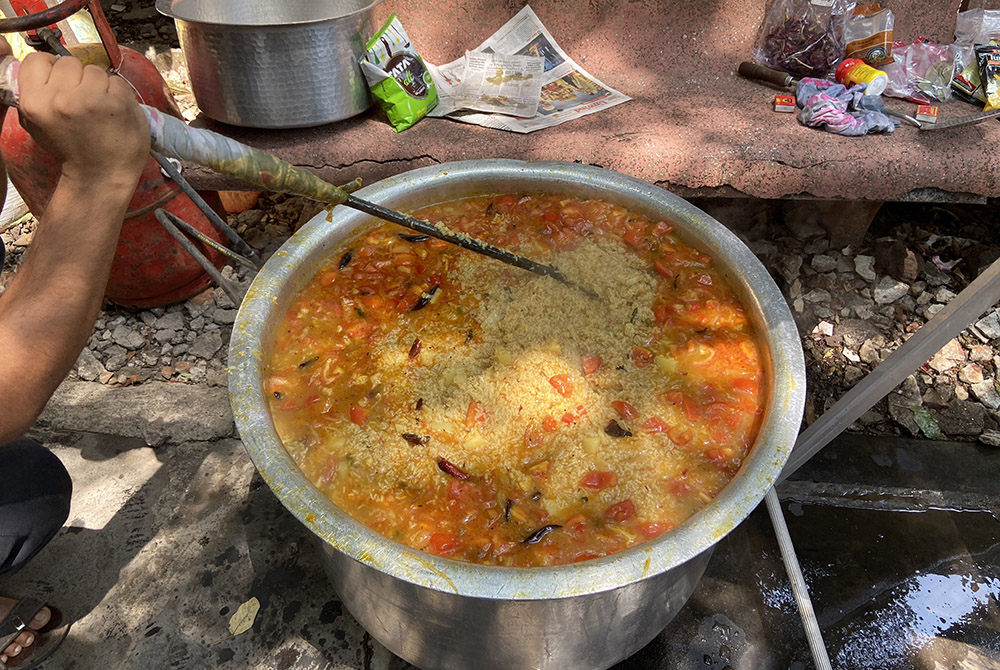
A person in Mumbai prepares a rice meal April 2. (CNS/Roli Srivastava, Thomson Reuters Foundation)
India had extended its COVID-19 lockdown, but this extended period of total shutdown in the country was not a period of "rest" for millions of people living in poverty. They seem to have crossed the threshold of tolerance, for we see them running across streets and lanes in search of food.
Our streets in Mumbai testify to this, in spite of the fact that many agencies — including ours — have been reaching out to them. Since the time the lockdown was announced, with the help of volunteers, we have been organizing cooked food and ration distribution (food provisions) in our neighborhood, especially to those areas where the benefits of the public distribution system do not reach the poor. However, we also realize that our efforts are tiny in light of the inexhaustible and never-ending needs in this time of scarcity. This raises a question if scarcity is real.
According to Jean Drèze, an economist, in a conversation with Kaushal Shroff on March 2020, in The Caravan magazine, the Food Corporation of India possesses nearly 60 million metric tons of wheat and rice in its godowns (food grain storage places), which will rise even further after the harvest. Drèze said it could increase to around 80 million metric tons, which would be enough to help the hungry survive. Scarcity, then, is not real.
Food will reach the poor if the government truly wants it to. The Indian Public Distribution System can prevent hunger to a large extent, but it seems to be under tremendous stress as it needs transportation, communications, administration and machinery to get food to the poor.
Similarly — ironically — though the government has promised to transfer money to the poor through various schemes, these beneficiaries cannot go to banks due to the lockdown; when they will be allowed to go, the banks will be overwhelmed, as they were during the period after demonetization. It makes us ask whether the attitude of indifference towards the poor is more real than scarcity is.
Advertisement
According to Bloomberg Billionaires Index, India has quite a few billionaires. Along with them, several other rich and upper middle class families are also worried about the lockdown. What "scarcity" do they face today, except for a scarcity of generosity? Their unlimited wants are greater than the limited available resources — resulting in accumulation and hoarding. I don't imagine that COVID-19 has altered their standard of living.
How would they know the intensity of the suffering of the poor — for whom the scarcity of food has drained their physical and mental resources, and has made their struggle to survive more difficult? Could the rich feel the helplessness and desperation, the vulnerability and victimization of those living in poverty? The poor are the victims of a social system that does have a scarcity, not of food, but of sensitivity. The poor continue to be judged and labeled as being insensitive to other poor people and greedy for more rations! How unfortunate that the rich — whose "greed for more" does not end — do not consider the insecurity for tomorrow experienced by people living in poverty.
Recently, I contacted a rickshaw driver and his family who find it very difficult to sustain themselves due to the lockdown. I asked the woman if she needed rations because of the extension of the lockdown period. Her response startled me! She told me that she had obtained rations from the public distribution system, therefore the rations that we were offering could be given to someone else who would be in need just like her. This spontaneous response from a woman in poverty increased my appreciation of her, and made me reflect on her magnanimity and her care for fellow sufferers at this time of crisis. Yes, scarcity is real, but there is no scarcity of sensitivity and solidarity among the poor.
As we began distributing food, word spread quickly and we had long queues outside our convent. We wondered how this news spread so rapidly. The poor spread the word around the slum so that others too could benefit. That was their way of showing kindness to others, who were hungry just like them. That was their way of being magnanimous.
Someone who observed the queue remarked at the smiles on some of the beneficiaries' faces. As I thought about this remark, I was reminded of a quote from the movie "Fiddler on the Roof": "Even a poor tailor is entitled to some happiness!" Oh, how often we feel that the poor cannot smile. Does this feeling emerge within me because I am a service provider at this point? If I imagine myself in their shoes, extending my hands for charity, I know how embarrassing it would be for me. What did their smiles mean? Embarrassment or genuine happiness — I don't know.
But this led me to ponder deeply about what will make the poor truly happy in the midst of this pandemic pandemonium. It would certainly be something which they are longing for. For the migrant workers it would be returning to their homes and reuniting with their loved ones.
For those who have rations, it would mean acquiring some more provisions so they can be ensured of at least one decent meal a day, until the time comes when they can fend for themselves.
For those who have no means to provide for their families it would be getting back to their jobs.
For the homeless, a roof over their heads and a safe distance from the constant police harassment would be their happiness.
For those whose homes are too small to accommodate them during this lockdown, a little more space to breathe would make them happy.
A little more care, love and understanding shown in attitudes and actions are all what they need.
But even though they are entitled to some happiness, none of these really exist, because for the poor, scarcity is real.
[Lavina D'Souza is a Canossian sister from Mumbai, India. In her present ministry as the director of the social center in Mumbai, she uses rights-based approaches in community development programs.]





